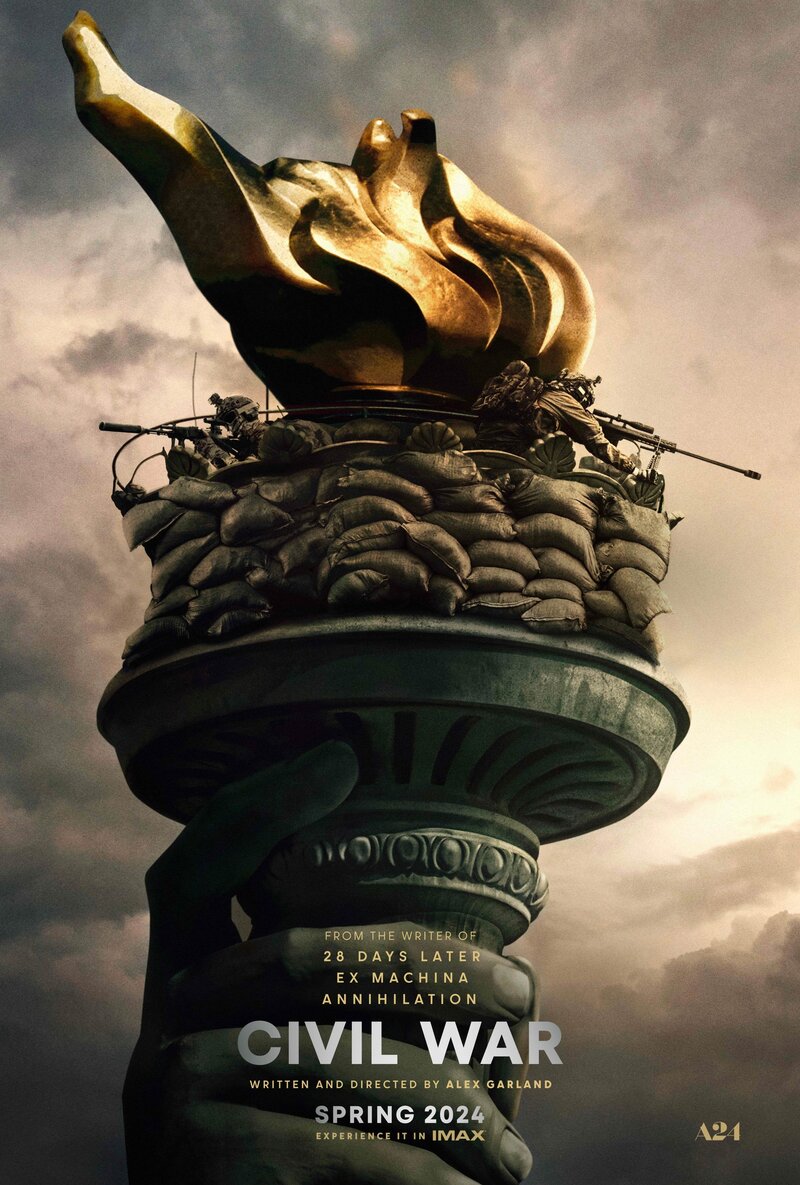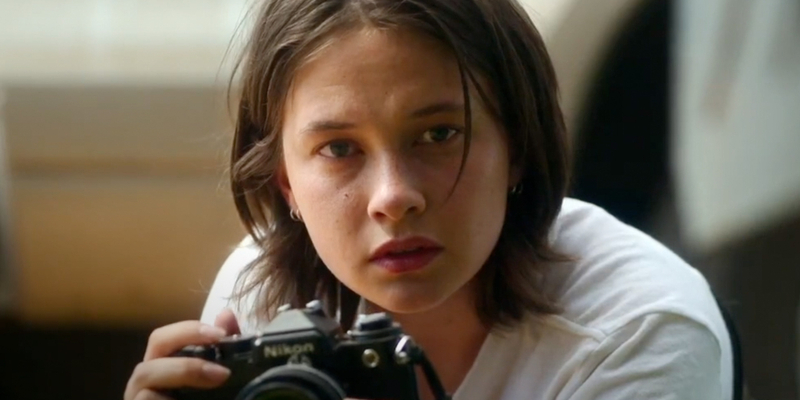
Review by
Eric Hillis
Directed by: Alex Garland
Starring: Kirsten Dunst, Nick Offerman, Jesse Plemons, Wagner Moura, Stephen McKinley Henderson,
Cailee Spaeny

A popular book among cinephiles in the 1990s was David Kerekes and
David Slater's 'Killing for Culture: An Illustrated History of Death Film
from Mondo to Snuff'. Along with mondo shockumentaries and films like
Peeping Tom
and Emannuelle in America, which fictionalised the concept of the snuff film, the book delved into
cases of real life deaths which had been captured on film or broadcast live
on TV, like the on-air suicides of Bud Dwyer and
Christine Chubbuck. I recall being disturbed by reading an account of a child's drowning at a
public beach in the Netherlands, which was said to have been coldly filmed
by a couple of bystanders on their camcorders. How could somebody's first
instinct in a moment of tragedy be to hit record on a camera? Cut to
2024.
The sort of caught-on-film tragedies that were written about as almost
mythical in 'Killing for Culture' are now everyday occurrences, fodder for
social media algorithms, surfacing into our feeds like the gnawed off leg of
a swimmer in shark infested waters. Since being bought out by Elon Musk,
Twitter (or "X" if you insist) is awash with accounts dedicated to deaths
captured on camera. The more elaborate the demise, the more views it will
get. One wonders how the upcoming reboot of the
Final Destination
series will be able to compete.

Years after reading about it in 'Killing for Culture', but before it was
readily accessible on the internet, I found myself in possession of a VHS
tape containing the Bud Dwyer footage. The first time I watched it I was
properly freaked out, not so much by the act itself, but by the reaction of
the camera operator, who zoomed right in to a close up of the disgraced
politician's brains oozing out of his skull (this was being broadcast in the
middle of the afternoon!). Like the father who forces his son to smoke a
full pack of cigarettes to cure his nicotine curiosity, I rewatched the
Dwyer footage several times so as to become immune to it, so I could sleep
that night. They say tragedy plus time equals comedy, but tragedy multiplied
leads to indifference. Especially if you view tragedy through a screen. I
wish it weren't so, but nothing shocks me now, at least not on screen.
Alex Garland's Civil War is about how viewing tragedy
through a screen makes us numb to it. It focusses on war photographers, who
shuffle through warzones while staring through viewfinders, simultaneously
in the middle of horror and yet detached from it by a rectangular glass
shield. It features soldiers and civilian rebels who find it easier to kill
the enemy because the weapons they use create a similar remove. Unlike
conflicts of old, where you had to stare in the enemy's face as you drove a
blade through his belly, now you just have to look through a screen and pull
a trigger from a mile away. Hell, you can drop a bomb on a wedding in Iraq
from the comfort of an air-conditioned portacabin in Arizona.
Civil War imagines an America some 20 years in the future
that has been plunged into a conflict between Washington and several
secessionist states. Much to everyone's surprise, Garland isn't interested
in reflecting America's current culture war in his fictional conflict.
Civil War has as much relation to real life American politics
as Planes, Trains and Automobiles has to America's transport
networks. In both films' cases, all that matters is their respective
instability. It could easily have been set in a nation that is currently
experiencing a civil war, but let's face it, a lot more cinemagoers are
going to show up for a movie that features choppers attacking the White
House than one set in Sudan or Myanmar.
The film chronicles how two war photographers deal with their indifference
to the suffering around them. A 20-year veteran, Lee Smith (Kirsten Dunst) has seen it all. She doesn't seem to care anymore, but she seems to care
that she doesn't care. Her numbness eats away at her insides. When a fellow
shutterbug asks if she would photograph her corpse should she meet an
untimely end, without missing a beat Lee replies "What do you think?", but
she says it with a resignation that suggests she isn't happy that this is
now how she views the world. Conversely, college graduate Jessie (Cailee Spaeny) is just starting out on her career documenting atrocities. Jessie ends up
tagging along with Lee, journalist Joel (Wagner Moura) and elderly
writer Sammy (Stephen McKinley Henderson) as they make the dangerous
journey to Washington DC where they hope to interview the president (Nick Offerman) before he's killed by the secessionist forces making their way to the
capital.

The quartet come across various atrocities, and find themselves in some
life-threatening situations. Initially Jessie is so disturbed she can't
bring herself to raise her camera, but as the journey progresses she finds
that the very act of raising her camera to her eyes makes the horrors easier
to process. They're no longer real, just images, which she can control. By
the end she's grinning from ear to ear as she photographs a chopper firing
its cannons into a downtown DC building. The film's marketing may centre
Dunst but it's really Jessie's story, and Spaeny is as remarkable here as
she was in the title role of Sofia Coppola's
Priscilla. She's become the go-to girl for filmamkers wishing to portray a
corruption of innocence, a hardening of the soul.
Garland takes Truffaut's old maxim about every war movie being pro-war
because it's difficult not to make war seem exciting onscreen and gleefully
runs with it. The idea of America, or any country, being plunged into a
violent internal conflict is horrific, but the image of a chopper firing
missiles at the White House? Come on, that's fucking awesome! This rush is
largely reflected in the reactions of Moura's Joel, for whom every new
atrocity he gets to document is another injection of adrenaline. At one
point he tells Jessie that his job means he's unable to sleep, not because
he's haunted by a guilty conscience, but because he's always so amped at the
prospect of what the next day might bring.
Garland leaves it up to the viewer to decide whether Lee and her colleagues
are a bunch of evil ghouls profiteering from others' misery or heroes doing
important work. What it gets wrong about war photographers however is how
Lee and co. focus on capturing the most gruesome images. In reality such
professionals are all too aware that images of that nature won't sell
because nobody is willing to publish them, so instead they find the image
that best gets the message across in a palatable way that won't put the
reader off their breakfast.

Civil War made me think about how I grew up just down the
road from a civil war where being the wrong type of Christian on the wrong
street could get you murdered, but it seemed a million miles away because it
only existed on TV, whereas the current conflicts in Syria and Ukraine feel
much closer to home because I see its victims wandering around the streets
of my town when I pop out to the shops; there's no glass screen between
myself and the latter.
In Civil War's most tense scene, Lee and co. find their lives threatened by a
gun-wielding rogue soldier played menacingly by Jesse Plemons, who
asks "what type of Americans" they are. Even this character is viewing Hell
through a rectangular screen, in this case a pair of rose-tinted
glasses.

